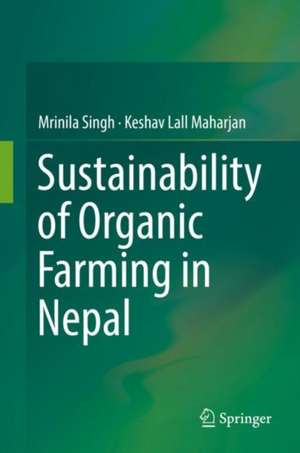Sustainability of Organic Farming in Nepal
Autor Mrinila Singh, Keshav Lall Maharjanen Limba Engleză Hardback – 22 noi 2017
Determining the benefits and/or challenges of organic and conventional farming is important to determining the most viable type of farming in the long term, but can be greatly impacted by a given area’s specific characteristics (social, environmental, political, etc.), which is why this study focuses on a specific location: the Chitwan district of Nepal, where group conversionto organic farming has existed alongside conventional farming for years. This book offers a useful guide for both practitioners and academic researchers who are interested in organic farming and food security, particularly in developing countries.
| Toate formatele și edițiile | Preț | Express |
|---|---|---|
| Paperback (1) | 594.02 lei 38-44 zile | |
| Springer Nature Singapore – 12 dec 2018 | 594.02 lei 38-44 zile | |
| Hardback (1) | 1002.61 lei 3-5 săpt. | |
| Springer Nature Singapore – 22 noi 2017 | 1002.61 lei 3-5 săpt. |
Preț: 1002.61 lei
Preț vechi: 1222.70 lei
-18% Nou
Puncte Express: 1504
Preț estimativ în valută:
191.87€ • 208.35$ • 161.17£
191.87€ • 208.35$ • 161.17£
Carte disponibilă
Livrare economică 01-15 aprilie
Preluare comenzi: 021 569.72.76
Specificații
ISBN-13: 9789811056185
ISBN-10: 9811056188
Pagini: 190
Ilustrații: XXIII, 208 p. 40 illus., 28 illus. in color.
Dimensiuni: 155 x 235 mm
Greutate: 0.52 kg
Ediția:1st ed. 2017
Editura: Springer Nature Singapore
Colecția Springer
Locul publicării:Singapore, Singapore
ISBN-10: 9811056188
Pagini: 190
Ilustrații: XXIII, 208 p. 40 illus., 28 illus. in color.
Dimensiuni: 155 x 235 mm
Greutate: 0.52 kg
Ediția:1st ed. 2017
Editura: Springer Nature Singapore
Colecția Springer
Locul publicării:Singapore, Singapore
Cuprins
Sustainability of Farming System: An Overview.- Status and Scope of Organic Farming in Nepal.- Organic Farming in Chitwan District of Nepal.- Socioeconomic Dimension of Farming System.- Soil Properties of Organic and Conventional Farming Systems.- Crop Management through Organic Means.- Crop Diversification under Organic and Conventional Farming Systems.- Income from Organic and Conventional Farming Systems.- Crop Production and Net Return from Organic and Conventional Farming Systems.- Status of Local Organic Market in Nepal.- Field Experimentation of Vegetable Production.- Organic Farming from Perspective of Three Pillars of Sustainability.
Notă biografică
Dr. Mrinila Singh, Graduate School for International Development and Cooperation, Hiroshima University, Hiroshima, Japan
Prof. Dr. Keshav Lall Maharjan, Graduate School for International Development and Cooperation, Hiroshima University, Hiroshima, Japan
Prof. Dr. Keshav Lall Maharjan, Graduate School for International Development and Cooperation, Hiroshima University, Hiroshima, Japan
Textul de pe ultima copertă
This book explores the sustainability aspect of organic and conventional farming systems, which is commonly categorized into three sub-aspects: social, environmental and economic. The social structure of a given area, organic friendly technologies, soil properties, crop diversification and income are the elements chosen for comparison, and are analyzed using descriptive and statistical methods. In addition, the book assesses the current status of the local organic market in Nepal and field experiments involving the use of various organic means to achieve better production for selected vegetables.
Determining the benefits and/or challenges of organic and conventional farming is important to determining the most viable type of farming in the long term, but can be greatly impacted by a given area’s specific characteristics (social, environmental, political, etc.), which is why this study focuses on a specific location: the Chitwan district of Nepal, where group conversion to organic farming has existed alongside conventional farming for years. This book offers a useful guide for both practitioners and academic researchers who are interested in organic farming and food security, particularly in developing countries.
Determining the benefits and/or challenges of organic and conventional farming is important to determining the most viable type of farming in the long term, but can be greatly impacted by a given area’s specific characteristics (social, environmental, political, etc.), which is why this study focuses on a specific location: the Chitwan district of Nepal, where group conversion to organic farming has existed alongside conventional farming for years. This book offers a useful guide for both practitioners and academic researchers who are interested in organic farming and food security, particularly in developing countries.
Caracteristici
Presents a comprehensive study of organic farming in a developing country Describes how organic farming compares with conventional farming in terms of sustainability Outlines a way forward for the development of organic farming
